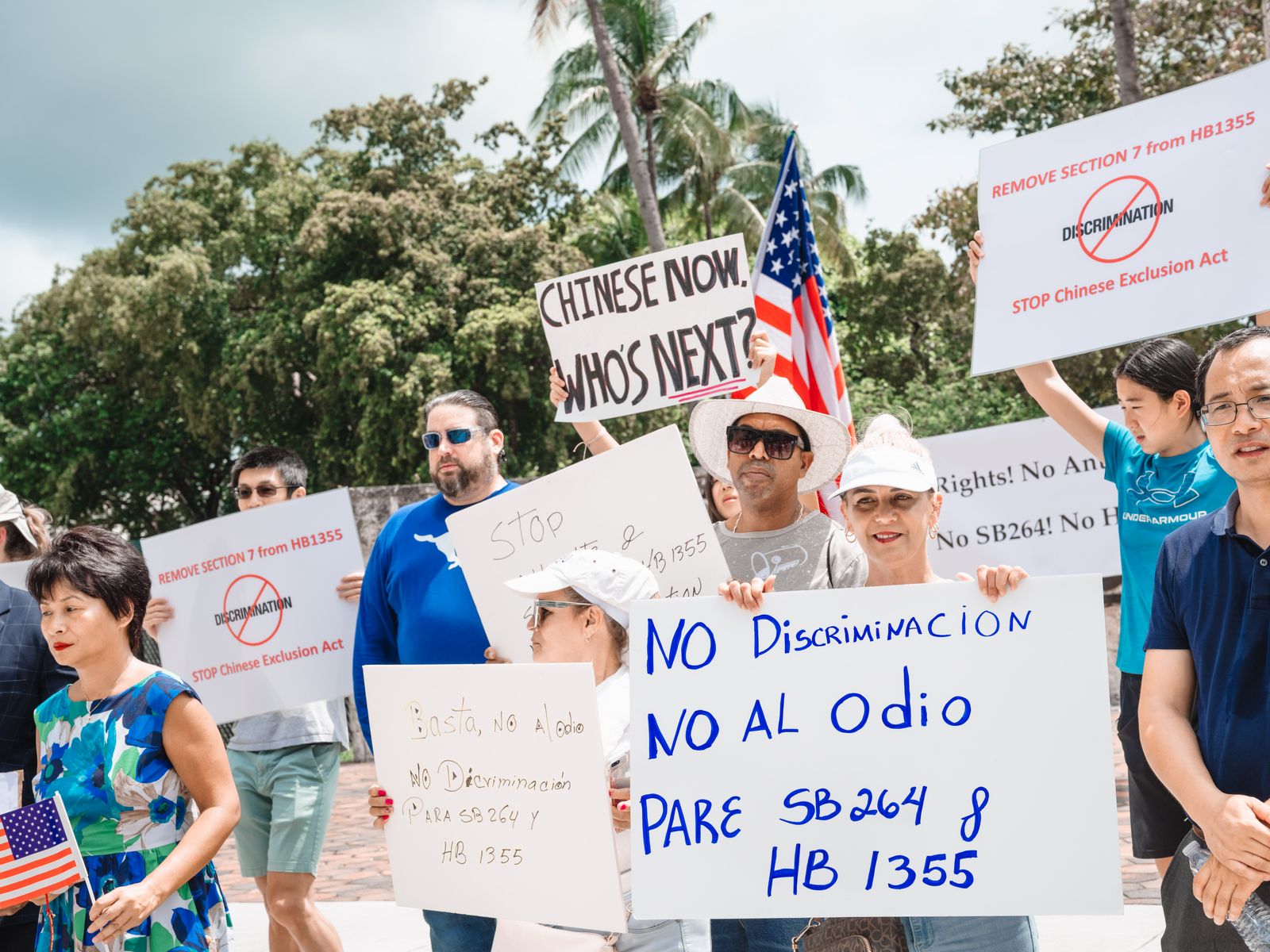States
Florida’s Contentious Property Law Was Challenged For Racial Discrimination

Property Law Was Challenged For Racial Discrimination: As Governor Ron DeSantis signed SB 264 on May 8, racial discrimination concerns are rekindled in Florida’s political arena. Civil rights groups, legal defense organizations, and affected people have slammed the legislation, which prohibits Chinese immigrants and others from buying land.
The ACLU, Chinese American Legal Defense Alliance, Asian American Legal Defense & Education Fund, and Quinn Emanuel are challenging the law’s legality in court. Their goal is to stop July 1’s law enforcement.
Plaintiffs and proponents say the legislation unjustly targets Chinese people and others from Cuba, Venezuela, Syria, Iran, Russia, and North Korea with punitive restrictions and fines. Critics say this reinforces racial stereotypes and prejudice, violating the Fair Housing Act.
The ACLU draws similarities to the early 20th century when similar “alien land laws” targeted Chinese and Japanese immigrants and were ruled down for breaching constitutional protections. Advocates warn that the Florida legislation if upheld, might injure and suffer impacted communities, mimicking the Harada family’s property rights dispute in California owing to discriminatory policies.
Zhiming Xu, a Chinese refugee in the US, may cancel a property purchase owing to the looming legislation, putting his future at risk. According to Louisiana high school sophomore Abigail Hu, who testified against a similar measure in her state, the law’s vast effects would emotionally drain impacted communities.
More inspection shows that the rule restricts non-US nationals with permanent homes in China or other designated nations from buying property. Even with visa and asylee provisions, the legislation prohibits property purchases near many military sites, drastically reducing real estate alternatives.
As anti-Asian attitudes develop, the legislation has raised worries about discrimination and hate crimes, increasing Asian American discomfort. The court challenge claims that the law’s basis, tying Chinese house ownership to national security dangers, is unsupported and racist.
The ACLU and its supporters are committed to protecting the constitutional rights of all individuals, regardless of their nationality. This legal dispute, unique to Florida, has the potential to establish a precedent for fairness and impartiality.
Florida’s Discriminatory Property Law Maintains Racism
Florida’s new property legislation, SB 264, has been criticized by civil rights and legal defense groups for its discriminatory consequences. Advocates say the legislation fosters racial stereotypes and prejudice, highlighting Black and other minority struggles.
History: Remembering Black Community Injustices
The ACLU has been compared to the early 20th century’s “alien land laws” targeting Black communities. The ACLU highlights systematic racism’s destructive effects on vulnerable populations by citing families like the Haradas’ land ownership inequality.
Upholding Justice: Racial Discrimination Legal Challenges
The ACLU and its supporters will challenge Florida’s discriminatory property statute in court, demonstrating their ardent commitment to defending constitutional rights for all races. With the threat of increasing discrimination and hate crimes, particularly towards the Black community, this case is pivotal in the fight for justice and equality. The country watches this court battle, which will establish a precedent for the quest for a fair and just society.
Florida’s Controversial Property Law: Racial Discrimination Challenged
Civil rights and legal defense organizations have criticized Florida’s SB 264 for its racial bias. The contentious law has revived discussions about disadvantaged groups’ property market struggles in the state’s property market amid rising worries about systematic racism, especially in Black neighborhoods.
Looking Back At Racial Injustices In Property Ownership
The American Civil-Liberties Union (ACLU) has drawn comparisons to a dark period in American history when Black communities faced discrimination in land ownership during the current outrage. The ACLU highlights the history of racism and the necessity for solid legal protection for oppressed populations, notably Black people, by citing the Haradas’ experience.
Read Also: The Jacksonville Shooting Highlights Racism And Florida’s Education Laws
Pursuing Justice: Property Market Racial Discrimination Lawsuit
As legal challenges loom, the ACLU and its supporters prepare to fight Florida’s discriminatory property legislation in court, underscoring a commitment to protecting all constitutional rights. The current case is crucial to the fight for racial equality and social justice as concerns grow about a rise in discriminatory practices and hate crimes, especially in Black neighborhoods. With the nation’s eyes on this judicial dispute, its conclusion might set a precedent for the tireless pursuit of a more equal and inclusive society.
Fighting Systemic Racism: Equitable Property Rights Advocacy
While Florida’s disputed property legislation is in the limelight, advocacy organizations are stepping up their fight against systematic racism in the property market. These organizations are rallying to highlight neglected and ignored voices in Black communities to address long-standing inequities. Recognizing the interconnectedness of race and property ownership, they are advocating for comprehensive legislative changes and policy efforts that promote equal housing and property rights for all people. These organizations use strategic advocacy campaigns, grassroots mobilization, and coalition-building to create a more inclusive and fair housing landscape that condemns discrimination and promotes racial justice and equality.
Educational Empowerment: Fighting Real Estate Racial Bias
Due to the problematic growth in discriminatory property laws and practices, community-led educational projects are gaining popularity to equip people and communities to address racial prejudice in the real estate industry. These projects provide extensive educational materials, seminars, and advocacy training to help underprivileged people understand their rights and legal options. These educational programs aim to create a culture of awareness and resilience that empowers people to challenge discrimination and advocate for fair treatment in property ownership and housing. Educational efforts generate a community feeling of action and empowerment, essential for fundamental social change and removing property market racial inequalities.













You must be logged in to post a comment Login